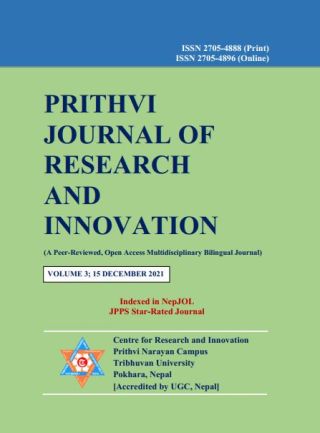The Status of Abiotic Components in Aquatic Environment of Khaste Lake, Pokhara
DOI:
https://doi.org/10.3126/pjri.v3i1.41626Keywords:
Abiotic, total alkalinity, total dissolved solid, dissolved oxygen, Khaste LakeAbstract
Water is one of the most significant natural resources. In plants and animals, different physiological processes like respiration, photosynthesis, absorption of nutrients and other metabolic process get influenced by the amount of availability of water. This study has been conducted to evaluate water quality of Khaste Lake, Pokhara. After the collection of water samples, chemical parameters such as dissolved oxygen (DO), free carbon dioxide (F-CO2), hydrogen ion concentration (pH), total alkalinity (TA), total hardness (TH), total solid (TS), total dissolved solid (TDS), calcium (Ca), magnesium (Mg) and chloride ions (Cl-) have been measured in the chemistry laboratory, using standard methods prescribed by American Public Health Association (APHA, 1999) whereas the depth, transparency and temperature have been measured on the spot. The obtained values of physico-chemical parameters have been compared with the criteria of World Health Organization (WHO) and other lakes. The research reveals that all the abiotic components of the Khaste Lake meet the WHO standard of water quality. This research work concludes that the water quality of Khaste Lake is much less polluted and suitable for all the aquatic lives so far. Discharge of domestic sewage, use of fertilizers and pesticides in agriculture fields and other solid waste dumps can be the major threats for sustainability of the lakes. Awareness to the public and continual management need to be done to prevent the possibility of pollution and eutrophication process.
Downloads
Downloads
Published
How to Cite
Issue
Section
License
Copyright (c) 2021 Centre for Research and Innovation (CRI), Prithvi Narayan Campus (TU)

This work is licensed under a Creative Commons Attribution-NonCommercial 4.0 International License.
© Centre for Research and Innovation (CRI), Prithvi Narayan Campus (TU)

